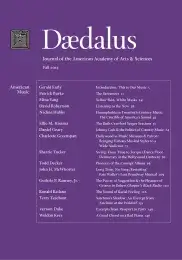Homophobia in Twentieth-Century Music: The Crucible of America’s Sound
Challenging notions of the composer as solitary genius and of twentieth-century homophobia as a simple destructive force, I trace a new genealogy of Coplandian tonal modernism–“America’s sound” as heard in works like “Rodeo,” “Appalachian Spring,” and “Fanfare for the Common Man” – and glean new sociosexual meanings in “cryptic” modernist abstraction like that of Gertrude Stein and Virgil Thomson's opera “Four Saints in Three Acts.” I consider gay white male tonalists collectively to highlight how shared social identities shaped production and style in musical modernism, and I recast gay composers’ close-knit social/sexual/creative/professional alliances as, not sexually nepotistic cabals, but an adaptive and richly productive response to the constraints of an intensely homophobic moment. The essay underscores the pivotal role of the new hetero/homo concept in twentieth-century American culture, and of queer impetuses in American artistic modernism.
Around 1938, following decades of anxious fretting over the lack of a distinct American voice in concert music, something fresh and new emerged and at last defined an American national sound. It was elegantly clear and stately while also broadly appealing and tonal, and it became best known through Aaron Copland’s music, especially in such works as Appalachian Spring, Fanfare for the Common Man, Rodeo, and Billy the Kid. By now we have heard it in Hollywood westerns and dramas, car and airline commercials, and campaigns for the American Beef Council. We have learned to conjure rugged cowboys, vast golden prairies, and pioneer lives of hardship and simple faith whenever we hear Copland or his many imitators. We may not even know we are hearing Copland, for the sound is now practically public domain. But we know what it means.
This music means America–in its most beloved, idealized, simple-but-dignified form. It is the soundtrack of our national rituals. Copland’s music represents the American spirit in times of celebration –the opening ceremony of the 2002 Olympics in . . .
